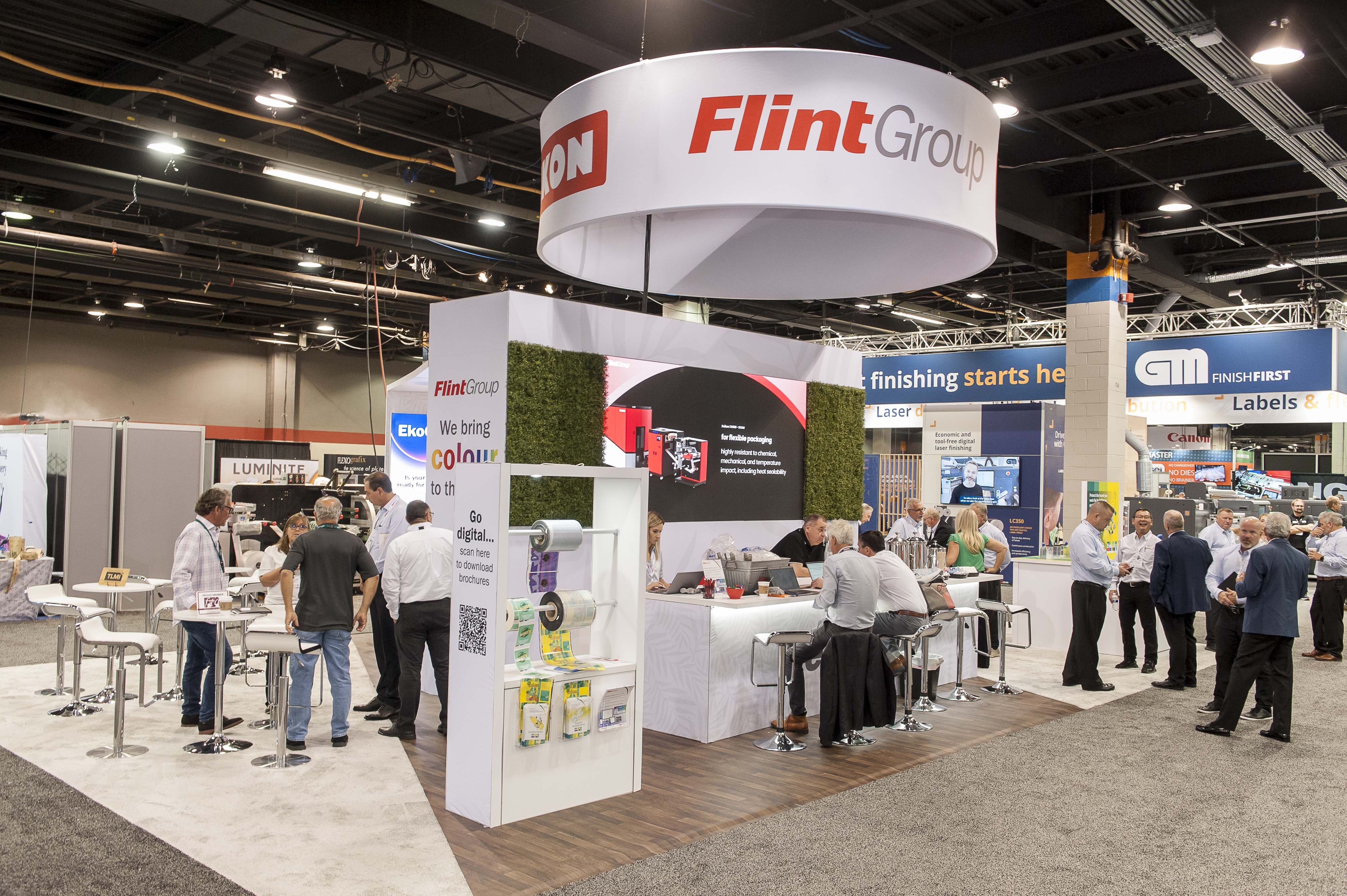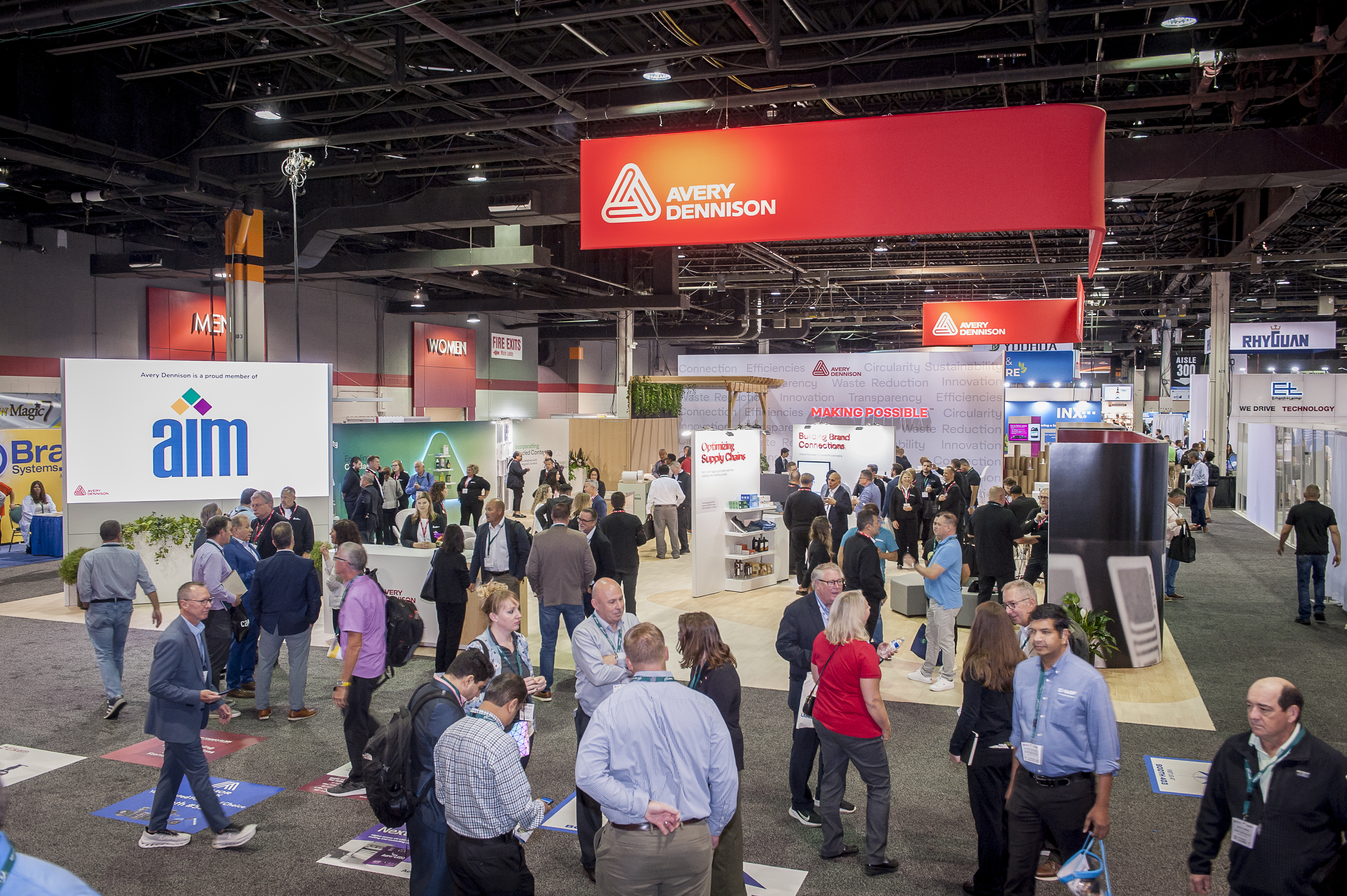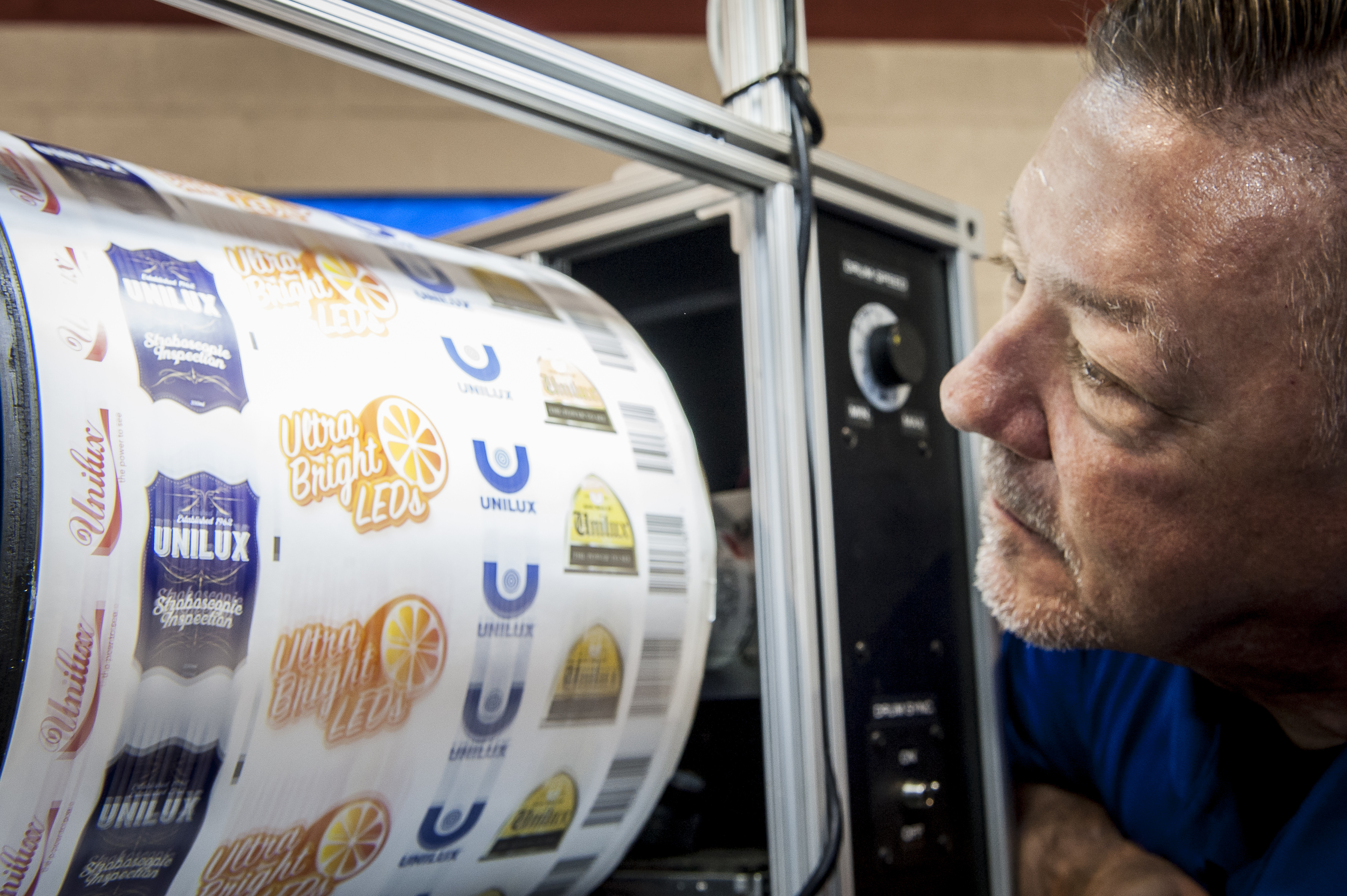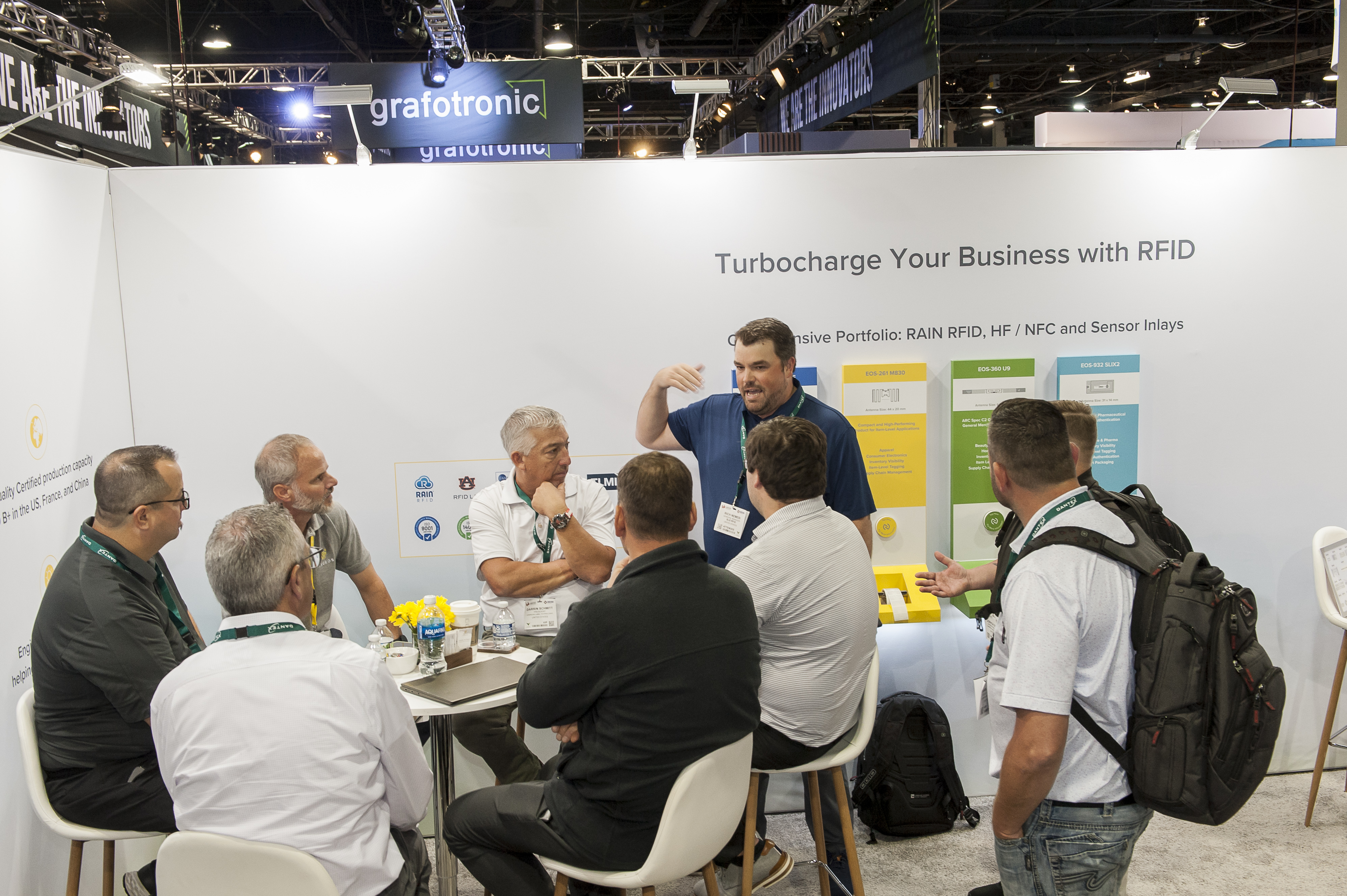Labelexpo Americas 2024: Materials
Innovations presented by materials suppliers at Labelexpo Americas 2024 offered products for brand owners seeking a strong market presence while prioritizing packaging circularity in light of evolving sustainability regulations

Brand owners are constantly innovating packaging formats not just to improve shelf appeal and consumer experience but also to enhance packaging circularity. These innovations are driven by increasing pressure from fast-approaching and evolving packaging regulations.
Sustainability regulations are broadening to include recycling rates and the use of recycled content. Though the specifics vary by region, these regulations are no longer confined to select countries.
Packaging material manufacturers are developing products to provide converters and brands with sustainable alternatives. Recyclable materials, removable components and recycled content were among the standout trends at this year’s Labelexpo Americas. Inks, coatings and adhesives with reduced reliance on natural resources and enabling the adoption of UV LED were also on display. In particular, RFID took center stage with an RFID experience center and an array of developments for RFID applications.
Underlining overall trends that could be seen at the show, Randy Scott, vice president of sales for labels and specialty films at Cosmo Films, says: ‘When it comes to trends, we’re seeing a strong shift toward digital printing, with many presses now combining digital and traditional flexo. The two biggest trends we’re seeing are digital printing advancements and the growing emphasis on recyclability, which is what many customers are asking about.’
RECYCLABLE MATERIALS
Plastic recycling is a global goal and essential to the circular economy. Labels are crucial for determining the recyclability of packaging. To enhance recyclability, manufacturers are creating label materials that can be easily separated during recycling, leading to higher quality recycled plastic yields.
Innovia Films showcased Rayofloat shrink sleeve film for PET, HDPE and PP recycling, along with thinner Rayoface CPE and WPE label films with a reduced carbon footprint and Rayoface JBD, a semi-solid film offering improved yield and opacity over solid white films.
Yupo introduced CleanSort, a next-generation in-mold label that fully detaches during recycling, allowing bottles to be recycled back to polymer form. It is compatible with HDPE, PP and PET resins.
CUSTOMERS WERE EXCITED TO SEE NEW OPTIONS AND MODERN EQUIPMENT, AS IT MEANS MORE SUPPLY AND A GREATER VARIETY OF PRODUCTS, WHICH FOSTERS HEALTHY COMPETITION AND BENEFITS EVERYONE
Beontag launched its new Wash-Off portfolio for PET bottles. When immersed during the PET recycling process, Wash-Off labels peel off easily, preventing contamination and allowing a second or third generation of PET to be repackaged and reused.
Fedrigoni also focused on wash-off labels for glass bottles. This label can withstand ice buckets and refrigeration, but when it’s time to reuse the bottle, the label can be easily removed with a 2 percent caustic bath.
Cosmo Films launched shrink sleeve label films that can be recycled with PET bottles. The company also highlighted its BOPP heat-resistant film that is well suited for both adhesive and extrusion lamination.
On show was also a range of Cosmo synthetic paper (CSP), an alternative to traditional paper. The company also displayed its high-barrier label films, high gloss films, matte-coated films and PVC-free films for graphic applications.
The company is undergoing significant expansion and will launch one of the largest BOPP production lines in India in March 2025. This new facility will produce 200 tons per day, totaling around 6,000 tons per month and 72,000 tons annually.

Cosmo is also expanding its manufacturing capabilities in the Chicago headquarters, where it is building a new warehouse. It will house a new 120-inch slitter for large and small rolls. One of the biggest challenges with producing products far away is ensuring timely delivery to customers. To address this, Cosmo is investing to bring material closer to customers.
Sandeep Dutta, president of overseas operations at Cosmo Films, says: ‘Labelexpo Americas provides a platform for showcasing innovation and fostering industry connections. Our presence here highlights Cosmo Films’ commitment to the Americas market, where we have a strong presence with local warehousing and distribution and continue to innovate to meet evolving market demands.’
EDUCATION IS KEY. MANY PEOPLE DON’T FULLY UNDERSTAND WHAT THEY’RE ASKING FOR, OR WHY CERTAIN PRODUCTS COST MORE. A COMPOSTABLE ADHESIVE IS PRICIER BECAUSE IT’S DESIGNED TO DEGRADE FASTER AND HAS DIFFERENT QUALITIES FROM A REGULAR ADHESIVE
Another significant trend highlighted at the show was the emphasis on minimizing material consumption in label production. Products like thinner labels, linerless labels and materials made from alternate resources were seen at the show.
Armor Iimak introduced new ribbons on a 4-micron PET base, cutting plastic use by up to 12 percent per roll. It also highlighted its SolFree product, a 100 percent solvent-free thermal transfer ribbon process with reduced CO2 emissions.
Wacker focused on its silicone release coatings for labels and liner applications. The biggest focus for Wacker at the show was linerless.
Timothy Rummel, technical manager performance chemicals at Wacker, says: ‘Linerless labeling is steadily growing, and we believe it’s the future of the industry. However, due to the equipment changes required across the value chain, the transition will likely take many years, if not decades. As new and improved products enter the market, we expect the growth rate to accelerate.’
PCR CONTENT AND COMPOSTABLE MATERIALS
Attendees at the show saw label materials made from recycled content. These eco-friendly materials demonstrate a shift toward reducing environmental impact by repurposing waste.
UPM Raflatac showcased its new portfolio of UPM Raflatac Carbon Action plastic labels. UPM Raflatac also promoted UPM Raflatac Forest Film, a 100 percent wood-based plastic face material that’s ISCC Plus-certified bio-circular on a mass-balance basis; UPM Raflatac Ocean Action, the ISCC Plus-certified label material designed to combat ocean-bound plastic pollution; UPM Raflatac RAFNXT+, a labeling material verified by the Carbon Trust to reduce carbon footprint and help mitigate climate change.
Finally, UPM Raflatac highlighted the RafCycle Partner Program, enabling converters to offer to their customers label release liner collection and recycling services.
Klöckner Pentaplast featured its SmartCycle range of heat shrink sleeve label films, including SmartCycle Plus, manufactured with up to 30 percent PCR. Also on show was the SmartCycle Pro line recyclable heat shrink sleeve label film featuring a 30 percent PCR.
Polyart Group launched r-Polyart, which claims to be the first synthetic paper made of 30 percent post-consumer recycled material. Another new product, Fiberskin Tag, is a tear- and water-resistant 100 percent paper that is recyclable, biodegradable and compostable. It is suitable for food contact and printable by thermal transfer for sustainable tags, wristbands, and water-resistant labels.
LABELEXPO AMERICAS PROVIDES A PLATFORM FOR SHOWCASING INNOVATION AND FOSTERING INDUSTRY CONNECTIONS
Lecta showed its range of facestock and release liner products for the pressure-sensitive label market, including one-side coated Creaset, cast-coated Eurokote, release liner Linerset, metalized Metalvac, thermal Termax, and new ‘Recy’ papers made from recycled fibers.
Innovia Films showcased its latest portfolio, including sustainable films, label and packaging films with recycled content and barrier functions and PVC-free graphic arts films made from polypropylene.
In the wine and spirits segment, Fedrigoni showcased alternative fibers, including a 100 percent cotton product line and a 100 percent sugarcane labels line. The company also showed fiber blends, where only a portion is made from alternative fibers, such as cotton, to improve sustainability.
Lauren Beck, key accounts manager, wine market specialist, North America, Fedrigoni, comments: ‘A major highlight in the US is our 100 percent recycled content labelstock, made from a 50-50 blend of pre- and post-consumer waste. There’s a known shortage of these materials, and their quality degrades with each recycling cycle. Additionally, factors such as inks and oils can further reduce quality and affect the visual appeal. To address this, we use pre-consumer waste from our paper production for a higher-quality recycled blend, ensuring a visually appealing and supply-stable product.’

Elevate Packaging showed its range of compostable labels. Richard Cohen, president and CEO, says: ‘Founded in 2000, we were the first company to establish a fully sustainably focused packaging company with the mission to eliminate plastic waste and to restore the planet. We initially launched our PSA label line at Labelexpo Americas in 2008. The market has been slow to adopt sustainability because of a lack of understanding despite a rapidly growing opportunity. We have been working with converters to reduce their risk and improve their profitability by providing them with a turnkey system to use composable materials, either in flexible films or PSA label stock.
‘All the materials we use are backed by the Compost Stewardship Institute’s circular take-back program, which has certified our packaging, labels, and materials as compostable. Additionally, it facilitates the collection, sorting, and composting of all materials, providing the end customer with a completely circular compostable system.’
DURABILITY AND AESTHETICS
While sustainability is essential, product appeal remains the top priority on supermarket shelves. At the show, label materials that can withstand harsh conditions while preserving their visual appeal were prominently featured.
Aluminium Féron, a first-time exhibitor, showcased synthetic paper Monotex for digital printing as well as substrates for durable applications such as tear resistance, high-temperature resistance, metal detectability or RFID protection.
PPG Teslin showcased Teslin, a synthetic material offering durability and performance in challenging environments.
Showcasing products for enhanced shelf appeal, Mactac showcased its new Vivid chrome film labels developed for improved printability and barrier resistance to moisture and oil migration to prevent label staining. Mactac partnered with Fortis Solutions Group for a live demo applying Vivid film labels at its booth.
Also on show was the new direct thermal portfolio without bisphenols developed to comply with regulations limiting exposure to bisphenols, including the new logistics grade direct thermal material, MacScript 2 prescription grade and non-top coated grade.
Wausau Coated Products promoted pressure-sensitive adhesive label materials, custom-engineered coating equipment for quick changeovers and flexible coating technologies. They offer top coating options like flexo, indigo, aqueous inkjet and other digital.
Nobelus showcased tactile finishes for prime labels using unsupported films and wet lamination. Highlights included Karess Film, with a velvety soft finish for luxury brands, and FineGrit Film, offering a durable, sandpaper-like texture.
Brand protection is another area where material exhibitors were able to show their innovations for anti-counterfeiting.
Astron Packaging introduced its Tackify pressure-sensitive labelstock from the new Coated Products Division. It promoted Dry Feek Void, a brand protection technology that leaves a dry adhesive residue in a VOID pattern when the label is removed. Additionally, it showcased Customized Void, which allows for personalized artwork and colors in place of the standard VOID pattern.
Ultra Destructible Vinyl, an overt brand protection product was also shown. Due to its’ eggshell-like’ face construction, it is almost impossible to scrape off from the substrate. VeilReveal, also promoted at the show, is a covert product where a customized artwork printed on a residual face layer is revealed on the substrate upon label tampering.
Astron also showcased hybrid acrylic adhesives for challenging applications like in-line molded containers and corrugated boxes and PCR PET Films with eight to 40 percent PCR waste.
Digimarc showcased its smart label technology with digital watermarking, which is widely used for identifying and authenticating physical and digital items, including a notable partnership with a consortium of global central banks.
RFID
The array of RFID technology at Labelexpo Americas 2024 demonstrated that RFID is now revolutionizing the label industry. Exhibitors showcased innovative applications that connect the physical and digital worlds. With rising demand for connected packaging, RFID technology offers brands valuable insights, enhances supply chain management, and can deliver personalized consumer experiences.
Beontag showed its latest innovation, Eco tags and the range of ARC-certified products that form a key enabler of all UHF and RFID services.
A major highlight at the show was the announcement of its new factory in Dayton, Ohio. The factory marks an 80M USD investment. The factory, still in its first phase, will eventually expand to include three phases and feature extensive RFID capabilities.
Ricardo Lobo, CEO of Beontag, comments: ‘We’re really hopeful that a lot of US growth will come from the introduction of new products and technologies, which was a big focus at Labelexpo Americas 2024. Customers were excited to see new options and modern equipment, as it means more supply and a greater variety of products, which fosters healthy competition and benefits everyone.
There’s also a lot of excitement around our expansion into RFID, especially with our first North American factory now up and running. This adds to our global presence with facilities in Guangzhou, Bologna, Campo Morão, and our new R&D center in Tampa.’
The company’s paper-based Eco Tags are designed for intelligent packaging functionalities in the supply chain, retail and e-commerce applications. The technology enables paper-based RFID tags, providing a plastic-free and recyclable solution for packaging authentication.
Lobo added: ‘We’re in the process of completing the Life Cycle Assessment (LCA) on this product, but we already know from its design that it will reduce the carbon footprint by 30, 40, or even 50 percent. We’ve already produced millions of units, which means we’ve prevented the use of thousands, if not millions, of plastic bottles. It’s an exciting development.’

Avery Dennison promoted its RFID capabilities for warehouse and supply chain applications. Booth visitors also discovered products that enable recycling or reuse and learned how they can contribute to a more sustainable future.
Anh Marella, vice president of marketing at Avery Dennison, says: ‘We are seeing a lot of interest in connected packaging and how can the technologies of RFID drive and transform new industries and revolutions and how they work giving enhanced visibility to supply chain, logistics as well as inventory management. And how do our consumers engage better with brands and intelligent products?
‘I’m really excited about the show. Just two years ago, we were dealing with Covid-19, and now it’s amazing to see all the energy and excitement from everyone around. It’s great to talk about the innovations we can achieve together as an industry, partner up, and truly make a positive impact on the world.’
Boingtech showcased a range of RFID products, including inlays, labels and tags. Visitors saw PET-free, paper-only options and RFID products for metal and wash-resistant applications.
The RFID Experience at Labelexpo Americas 2024 was a major highlight, drawing strong interest as attendees explored the potential of RFID and smart labels. Avery Dennison showcased RFID inlay tech, Delta ModTech demonstrated high-speed tag insertion, and Voyantic displayed RFID chip programming. The event also featured a 4.5-hour workshop by the Label Academy, offering an in-depth look at RFID tag production and applications.
INKS AND COATINGS
Packaging cannot be considered truly sustainable unless the inks, coatings and adhesives used in its design are also contributing to that goal. To address this, ink and coatings manufacturers are developing products that are water-based and washable in the recycling stream, ensuring that the material yield remains pure and uncontaminated. In addition, inks and coatings made from carbon-neutral resources were a major highlight at the show.
Another noteworthy trend was the shift toward low-migration LED UV inks and coatings. Label converters around the world transition from traditional mercury UV lamps to more energy efficient and safer LED UV lamps.
Sun Chemical showcased SolarFlex CRCL inks for increased recyclability in labeling, high-adhesion SolarFlex UV flexo inks, SunCure Mono-web Coatings for reduced carbon footprint, SunVisto AquaGreen renewable inks, and MX12 ink dispensing technology for precise, waste-minimizing color mixing. Also featured are energy-efficient UV-LED inks, SunEvo digital technologies.
Actega promoted its low-migration inks and specialty coating effects for labels and flexible packaging, along with its Signite and Ecoleaf technologies.
Ink and coatings developed for the labels and flexible packaging industry include Actexact Safeshield inks for low-migration applications, LED-UV inks and coatings, haptic and optical effect coatings and opaque whites for labels, shrink sleeves and pouches.
Flint Group presented its Evolution de-inking primer and caustic-resistant Overprint Varnish (OPV), which enhance sustainability in packaging by improving material yield during the PET bottle recycling process.

The company also promoted the dual-curing EkoCure ink series, which eases the transition from UV mercury to UV LED curing and Ultra Clear Dual Cure Coatings, which can cure under UV LED lamps and UV lamps containing mercury.
HB Fuller showed Gel-Tac microsphere PSA for ultra-removable and highly repositionable labels. Gel-Tac utilizes water-based acrylic and pressure-sensitive microsphere technology for linerless self-wound labels. The company also presented its Swift melt Earthic 9010E, a near-carbon-neutral hot melt adhesive made from a high percentage of fossil-free and sustainable raw materials.
Interactive Inks & Coatings showcased its customizable UV adhesives for various applications, including lamination, PSAs, and glass and wallpaper release. Their water-based flexo inks and coatings provide sustainable printing alternatives, while UV inks and coatings offer durability and performance.
Henkel showed Technomelt PS 5052 Eco pressure-sensitive adhesive that has 52 percent bio-based content and Aquence PS 5500 RE pressure-sensitive adhesive for compostable labels.
INX International showed Genesis washable, INXFlex Contour and VerifyInk inks. Genesis is a recycle-friendly ink system that meets PET-CG-02 Critical Guidance Protocol for washable ink recyclable PET shrink sleeves. Genesis curable primer makes INXFlex Contour inks washable as well. This UV and LED dual cure flexographic ink system eliminates post-shrink adhesion loss and ink flaking. VerifyInk is a covert taggant technology that can be printed on paper, flexible packaging and shrink labels to combat counterfeiting using time-sensitive logistics, authentication, supply chain monitoring, and data-rich customer engagement features with unique smartphone readable codes on their products.
Natural Ink showcased a dual-cure ink series suitable for the LED transition. The inks cure under both light spectrums, LED and mercury lamps, allowing for a smooth transition to LED. Nazdar Ink Technologies launched the W181 series water-based inks that offer bio and renewable resource benefits and the new 68500 LED flexo series, offering improved economics of the dual cure product.
Siegwerk marked its 200th anniversary and showed the FastMatch Cloud, a cloud-based color management system, and APR-certified inks for sustainable recycling. Siegwerk also promoted Nutriflex Orbis DC inks for UV/LED printing in the food, pharma, cosmetic and tobacco industries; Apex for basic stick and shine coating; and Sicura DGT for digital printing technologies.
Zeller+Gmelin exhibited Nuvaflex energy-curable ink series and the new EarthPrint UV recycle primer. The Nuvaflex 17 series is formulated for shelf stability and complete curing under LED systems. The new EarthPrint product line is designed to combat raw materials shortages and product recyclability through enhanced wash-off capabilities.
Lastly, there was a significant focus on reducing plastic usage and waste at Labelexpo Americas 2024. Convergen Energy, in partnership with TLMI and Rosemont Exposition Services, collected waste at the event to convert label byproducts into feedstock, which replaces fossil fuels in power plants and industrial facilities.
Barriers to adoption
The products showcased at Labelexpo Americas 2024 demonstrate that sustainable solutions are readily available and brand owners are showing interest in them. However, what’s holding them back from fully embracing these options?
Lauren Beck, key accounts manager, wine market specialist, North America, Fedrigoni, says: ‘I’m noticing a significant shift towards using recycled content paper. There’s growing interest, but also a lot of misunderstanding around it. People don’t always realize that with recycled content, you’re not going to get a perfectly white label—there will be imperfections, and that’s just natural.’
Another misconception, she highlights, is that sustainability always comes with a higher price tag. While that may have been true in the past, especially with FSC-certified materials, where higher costs were due to certifications, that’s not always the case now, particularly in the wine and spirits industry.
‘As long as you understand your marketing goals, we can guide you to sustainable options that may not necessarily be more expensive. And education is key. Many people don’t fully understand what they’re asking for, or why certain products cost more. For example, a compostable adhesive is pricier because it’s designed to degrade faster and has different qualities from a regular adhesive. But FSC-certified material is essentially the same as its non-certified counterpart, with the added benefit of traceability. It’s not always about needing a compostable solution—sometimes it’s just about choosing something made in a more sustainable way,’ Beck explains.
Dan Riendeau, strategic business unit, director, packaging at Flexcon, adds that the company’s research shows that consumers struggle with convenience, education, and a basic understanding of recycling.
‘It’s crucial for the industry – label suppliers, converters and brands – to provide better education throughout the value chain. While 70 percent of consumers base packaging decisions on sustainability, there’s a lack of trust due to overstated claims.
‘We focus on educating both internal and external stakeholders through presentations and promoting sustainable practices. Sustainability has three key pillars: social, environmental, and product circularity. Companies must reduce waste, manage resources responsibly, and build strong community ties, emphasizing the 3Ps: people, planet and profit,’ he says.
Stay up to date
Subscribe to the free Label News newsletter and receive the latest content every week. We'll never share your email address.


